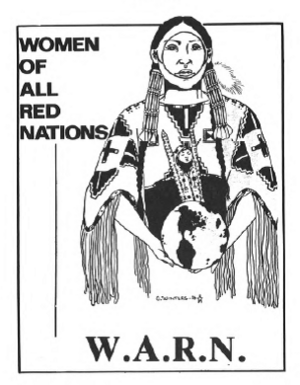Women of All Red Nations facts for kids
Women of All Red Nations, also known as WARN, was an important organization created by Native American women. It was started in 1974 by brave leaders like Lorelei DeCora Means, Madonna Thunderhawk, Phyllis Young, Janet McCloud, and Marie Sanchez.
The group brought together over 300 women from 30 different tribal communities. Many of these women had already been part of the American Indian Movement and took part in the 1973 Wounded Knee incident, a major event in the fight for Native American rights.
WARN focused on many important issues. They fought for the health of Native American women and families. They worked to protect the rights promised to tribes in treaties with the U.S. government. The group also spoke out against using Native American names and images as mascots for sports teams.
One of WARN's biggest concerns was the health problems on Native American lands. They pointed out that things like mining for nuclear materials were causing pollution. This pollution was linked to serious health issues, including birth defects and other illnesses.
WARN also brought attention to a very serious problem. Many Native American women were being given medical procedures that prevented them from having children, often without their full understanding or permission. The group also worked to make sure Native American children were not adopted by non-Native families without the tribe's consent.
Contents
The Start of WARN
There are slightly different stories about when WARN officially began. Some say it was in 1974 in Rapid City, South Dakota, while others say 1978. What is clear is that its founders were experienced activists. They had been part of the American Indian Movement (AIM), another group fighting for Native rights.
During the 1970s, many of the male leaders of AIM were arrested or had to go into hiding. This meant that women had to step up and take on more leadership roles. These women decided to form their own group, WARN, to focus on the issues that were most important to them and their communities.
The Rapid City Conference
In 1974, a special meeting for women was held in Rapid City, South Dakota. Over 300 women from many different tribes came to share their concerns. They felt that other groups were not paying enough attention to the problems faced by Native women.
At this conference, they officially created Women of All Red Nations. The group decided to focus on protecting the health and safety of Indigenous women. They wanted to improve healthcare, protect families, and fight for their rights.
Fighting for a Healthy Environment
WARN played a key role in raising awareness about the dangers of pollution on Native American lands, especially from uranium mining.
The Dangers of Uranium Mining
In 1980, WARN published a study about the water on the Pine Ridge Indian Reservation in South Dakota. A scientist helped them test the water for radiation from nearby uranium mines. They found that the radiation levels in the water were much higher than what the government considered safe.
The study showed that even a new well, which was supposed to provide clean water, had dangerously high radiation levels. This meant that the water people were drinking was a serious health hazard.
Health Problems on the Reservation
WARN also surveyed people living on the Pine Ridge Reservation. They found that there were unusually high numbers of serious health problems. Many babies were born with breathing issues, and many women had problems during pregnancy.
The group connected these health issues to the pollution from the uranium mines. The mines had contaminated the Cheyenne River, which was a major source of water for the reservation. WARN demanded that the U.S. government investigate the situation and help protect the people's health.
Protecting Women's Rights
One of the most important issues for WARN was protecting the rights of Native American women over their own bodies.
Unfair Medical Procedures
WARN spoke out against the practice of giving Native women medical treatments that stopped them from being able to have children. This was often done without the women fully understanding what was happening.
A study in 1974 by Dr. Connie Pinkerton-Uri, a doctor of Choctaw and Cherokee heritage, found that this was a widespread problem. Many women were pressured into agreeing to the procedure. Some were asked while they were in labor, and others were given papers in English that they couldn't read. In some cases, women were told they would lose government help or their children if they didn't agree.
Thanks to the work of WARN and others, the U.S. government created new rules in 1979. These rules were made to protect women and make sure they could give their full and informed permission for any medical procedure.
Protests and Action
WARN used protests and political action to make their voices heard. They worked with other national women's groups to fight for better laws and policies.
In 1978, WARN leader Janet McCloud organized a 3,000-mile march across the country to Washington D.C. This protest, called "The Longest Walk," was to oppose new laws that would have taken away Native American treaty rights to land, fishing, and hunting. Over 30,000 people joined the protest in the nation's capital.
More recently, members of WARN have been involved in protests against oil pipelines, like the Keystone XL pipeline. They argued that building the pipeline near reservations would threaten clean water and the safety of Native women and girls.


